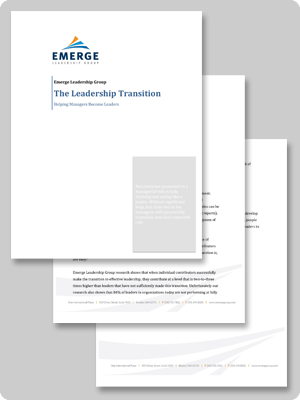Our Solutions
For more information about our leadership research, please download our white paper “Maximizing Your Impact as a Manager of Managers”

THE LEADERSHIP TRANSITION COMPANY
No products in the cart.
For more information about our leadership research, please download our white paper “Maximizing Your Impact as a Manager of Managers”

The third step in the leadership journey, Leaders of Leaders, now focuses on teaching leaders how to manage multiple teams, how to maximize the capacity of their first-line leaders, and what the necessary skills are to become the leaders of the organization. These leaders, are the backbone of the corporation, and they are looked to as the enablers of talent, culture, and results.
Research shows that at least 70% of all managers and leaders in today’s organizations are not meeting the contribution expectations for their role. The Maximizing Your Impact workshop is designed to teach the leaders of leaders in your organization how to maximize their contribution to the organization in their current role.
This workshop takes a unique approach in helping participants understand the key accountabilities for leadership positions. Participants are taught about how they need to shift their approach to their work, how they must change their behavior, and the tools they need to employ to become more successful leaders-of-leaders.
High performing employees don’t always translate into all-star first-line leaders. Learning how to lead a team can be a difficult task, especially if a leaders does not posses core leadership skills. Emerge Leadership Group offers targeted workshops to help organizations improve the relationships between management and their team members. Our results-driven programs help improve productivity, enhance employee motivation and retention, and develop employees’ work habits and potential.
1. Importance of Coaching?
a. Boost employee performance, productivity, and impact
b. Leadership growth and development
c. Address workplace problems
d. Drive employee engagement
2. What Coaching Is and What Coaching Is Not
3. Reflecting on Past Coaches
4. Coaching for Impact Framework
5. Results of Coaching Self- Assessment
1. Establish a Climate for Learning and Trust
a. Why Trust is so Foundational to Coaching
b. Trust Builders and Breakers
2. Provide a Context for Growth and Contribution
a. The Stages of Impact Model
i. Key Leadership Accountabilities for Each Stage
ii. Stages of Impact Assessment
iii. Leaders: Born or Developed?
b. Increasing leadership effectiveness:
i. Awareness and Willingness
ii. Letting Go and Focusing on Appropriate Leadership Behaviors
iii. Overcoming Obstacles to Meeting Expectations
iv. Sustaining the Change in Expected Behavior
1. Ask vs. Tell
a. Consider the Benefits and Drawbacks of Asking vs. Telling
b. Types of Questions (Open, Closed, Factual, Probing, Leading)
c. Designing Open-Ended Questions
2. Review the Three Levels of Listening
a. Listening for Verbal and Nonverbal Communication
1. Promote Discovery and Independence
a. Coaching Styles: Directive vs. Supportive
b. Commitment vs. Compliance
c. When to Use Each Style
1. ARISE Coaching Process
a. Review ARISE Process and Questions
b. Complete Coach Preparation Guide
c. ARISE Coaching Process Skill Practice
d. Debrief and Discuss What You Learned
1. Delegate, Instruct, and Provide Feedback
a. Reasons Leaders Don’t Delegate
b. The Importance of Stretch, Challenging Job Assignments
c. Types of Assignments by Stage of Impact
d. Six Delegation Checkpoints
e. Delegation Preparation Guide
f. Holding a Delegation Conversation
g. Evaluating Feedback and Elements of Effective Feedback
h. Providing Feedback for Performance and Impact
1. Forward – Looking Feedback
a. Feed Forward Exercise
i. Record High Impact 100-Day Actions
ii. Review and Summarize Expected Outcomes and Next Steps
2. Feedback and Course Evaluation
There are critical challenges and obstacles in becoming a leader-of-leaders and individuals are not left to fend for themselves. Emerge Leadership Group provides Leadership Coaches for those senior leaders who are working through this development.
COPYRIGHT © 2023. EMERGE GROUP. ALL RIGHTS RESERVED.